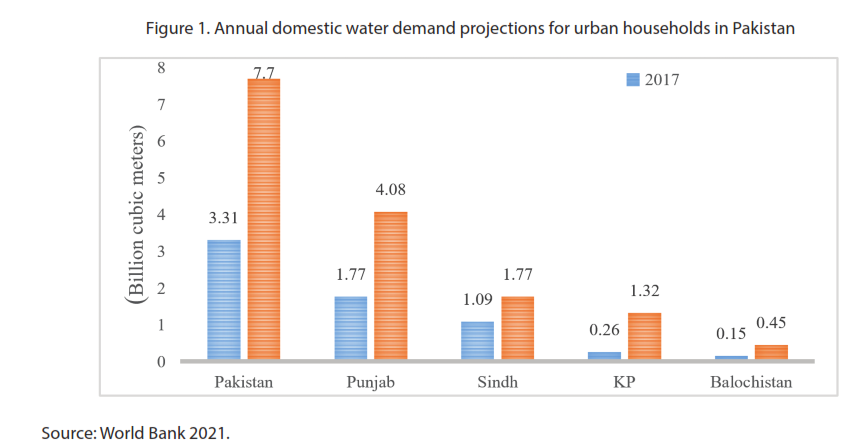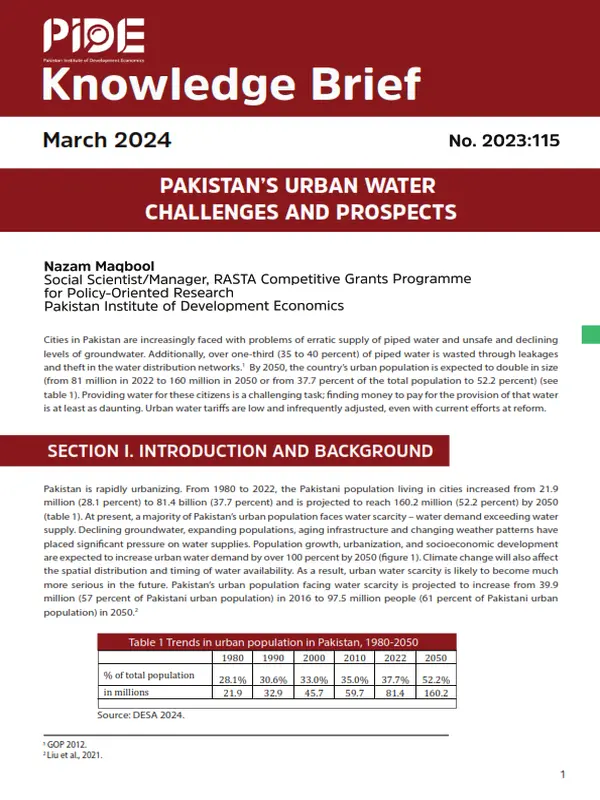
Pakistan Institute of Development Economics
- Home
Our Portals
MenuMenuMenuMenuMenuMenuMenu - ResearchMenuMenuMenuMenuMenuMenuMenu
- Discourse
- The PDR
- Our Researchers
- Academics
- Degree Verification
- Thesis Portal
- Our Portals
Pakistan’s Urban Water Challenges and Prospects
Cities in Pakistan are increasingly faced with problems of erratic supply of piped water and unsafe and declining levels of groundwater. Additionally, over one-third (35 to 40 percent) of piped water is wasted through leakages and theft in the water distribution networks.[1] By 2050, the country’s urban population is expected to double in size (from 81 million in 2022 to 160 million in 2050 or from 37.7 percent of the total population to 52.2 percent) (see table 1). Providing water for these citizens is a challenging task; finding money to pay for the provision of that water is at least as daunting. Urban water tariffs are low and infrequently adjusted, even with current efforts at reform.
SECTION I. INTRODUCTION AND BACKGROUND
Pakistan is rapidly urbanizing. From 1980 to 2022, the Pakistani population living in cities increased from 21.9 million (28.1 percent) to 81.4 billion (37.7 percent) and is projected to reach 160.2 million (52.2 percent) by 2050 (table 1). At present, a majority of Pakistan’s urban population faces water scarcity – water demand exceeding water supply. Declining groundwater, expanding populations, aging infrastructure and changing weather patterns have placed significant pressure on water supplies. Population growth, urbanization, and socioeconomic development are expected to increase urban water demand by over 100 percent by 2050 (figure 1). Climate change will also affect the spatial distribution and timing of water availability. As a result, urban water scarcity is likely to become much more serious in the future. Pakistan’s urban population facing water scarcity is projected to increase from 39.9 million (57 percent of Pakistani urban population) in 2016 to 97.5 million people (61 percent of Pakistani urban population) in 2050.[2]

_____________
[1] GOP 2012.
[2] Liu et al., 2021.
_____________
Water services in Pakistan’s major cities and urban centres remain fragmented and intermittent, as no city currently has 24-hour of water supply for seven days a week. Current water use in most cities is approaching or exceeds local sustainable supplies of surface and groundwater. Pakistani cities that are dependent on groundwater for municipal supply, such as Lahore, observe falling water tables requiring increased drilling and pumping costs. Cities that depend on surface water, such as Hyderabad, Karachi and Islamabad, face intermittent or insufficient supply. Reliable water supply is already challenging in many cities due to growing demand combined with ageing and insufficient infrastructure.
A mismatch between urban water supply and demand will impact in several ways. First, the health of (poorer) urban populations will suffer, due to drinking contaminated water or unsanitary conditions resulting from water scarcity. Second, the economic potential of urban areas will be reduced, due to disproportionate spending by municipalities, households and industries to ensure adequate water supply. Ensuring a reliable water supply has become an urgent policy concern for municipal leaders and city authorities.

SECTION II. URBAN WATER ISSUES AND CHALLENGES
Too often, cities in Pakistan operate under ill-informed and unsustainable water management and end up facing grave risks from coastal and inland flooding, scarcity of quality water, access inequalities and climate change. The problems range from poor management of water sources, contaminated supplies, leaky distribution networks and vast volumes of untreated wastewater being poured into Pakistan’s rivers.
2.1 WATER AVAILABILITY:
In urban areas of Pakistan, about 43 percent of the population does not have access to safely managed water (figure 2). That means that over 35 million people do not have safe water. By the year 2050, there will be nearly 180 million people in urban areas needing these services.



